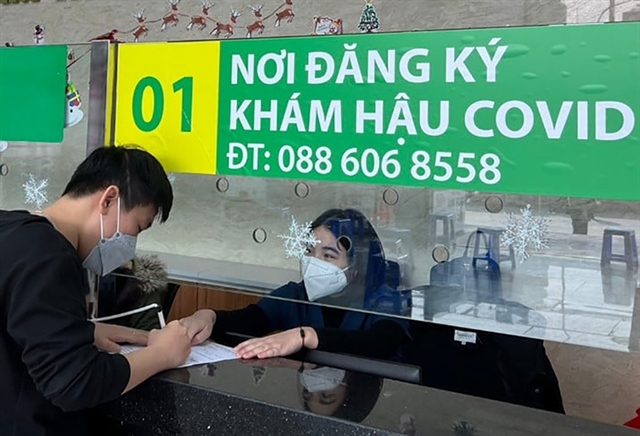 Society
Society

The Ministry of Health has encouraged people not to panic if they experience post-COVID symptoms, and has called on hospitals, medical institutes and health authorities to continue medical examinations, treatment and rehabilitation for people who are infected with COVID-19 or are recovering.

|
| A patient registers for examination at the Respiratory Center, Bạch Mai Hospital, after being infected with COVID-19. — Photo: qdnd.vn |
HÀ NỘI — The Ministry of Health has encouraged people not to panic if they experience post-COVID symptoms, and has called on hospitals, medical institutes and health authorities to continue medical examinations, treatment and rehabilitation for people who are infected with COVID-19 or are recovering.
Medical facilities have been asked to provide polyclinics and specialised approaches in examing people who have COVID-19 symptoms, especially in respiratory, cardiovascular and mental health.
The requirements will help ensure appropriate diagnosis and avoid the abuse of inappropriate and unnecessary indications.
Health facilities and departments must strengthen communication and raise public understanding so that people and medical staff can properly and fully understand the symptoms of both COVID-19 infection and recovery.
"As a result, people will know if they need a medical visit and can avoid too much worry and panic," according to the ministry's statement.
So far, Việt Nam has recorded more than 10.7 million COVID-19 infections, of which nearly 9.5 million patients have recovered. The number of daily new cases is decreasing.
However, many recovered patients have reported persistent signs or symptoms that are affecting their ability to work, and have gone for a health check.
At the same time, disseminating knowledge and providing health advice to people on the ways of rehabilitation and self-care for recovering from COVID-19 according to the guidance of the Ministry of Health is vital.
Earlier, the ministry issued the Guidelines for Rehabilitation and self-care for related diseases after COVID-19 (post-COVID-19).
According to the guideline, fatigue is one of the most common symptoms in the post-COVID-19 recovery phase, described as a feeling of physical and mental overload or exhaustion.
The ministry recommends each person should develop a flexible plan that allows them to work within their current capacity and avoid being overloaded.
Activity levels can then be gradually increased in a controlled manner over time, as energy levels and symptoms improve.
The ministry emphasised that if, after recovering from the COVID-19, people still have prolonged fatigue despite self-adjusting their activities, including impaired memory or concentration, muscle pain and headaches, people should visit a specialised clinic for proper diagnosis and treatment.
An urgent medical visit is needed if the person develops any dangerous symptoms, like shortness of breath from light activity, chest pains, heart palpitations, dizziness or if they find it difficult to speak or understand speech. — VNS

.jpg)


